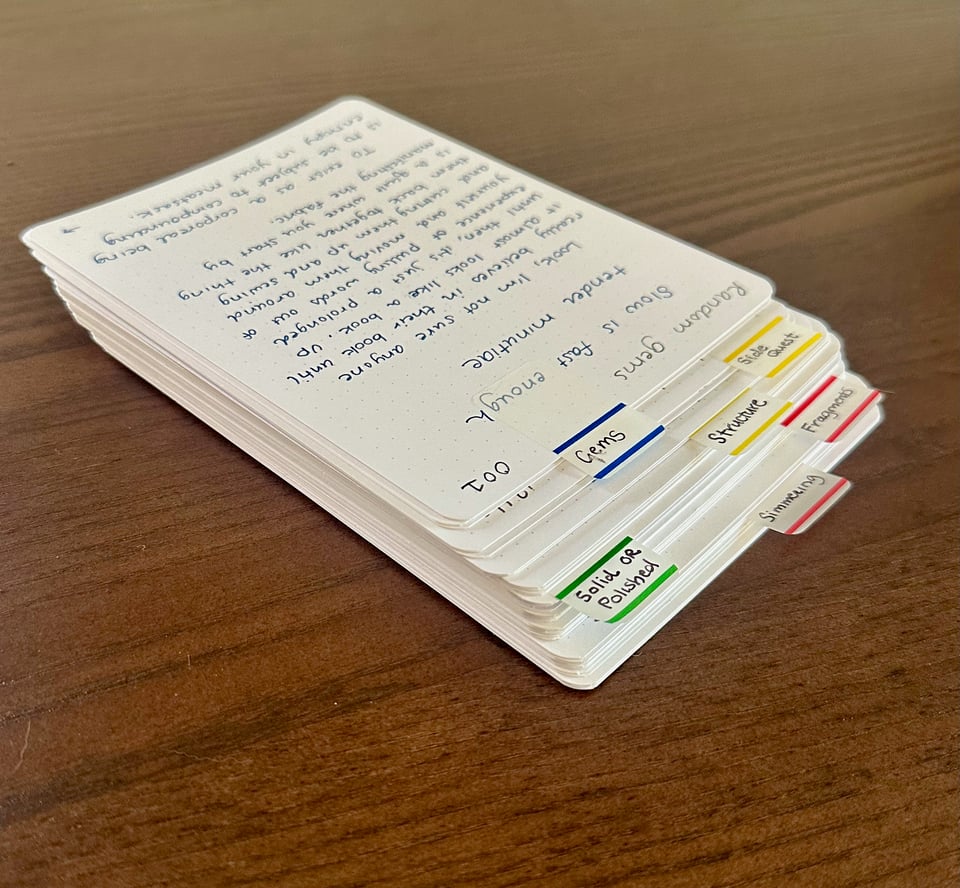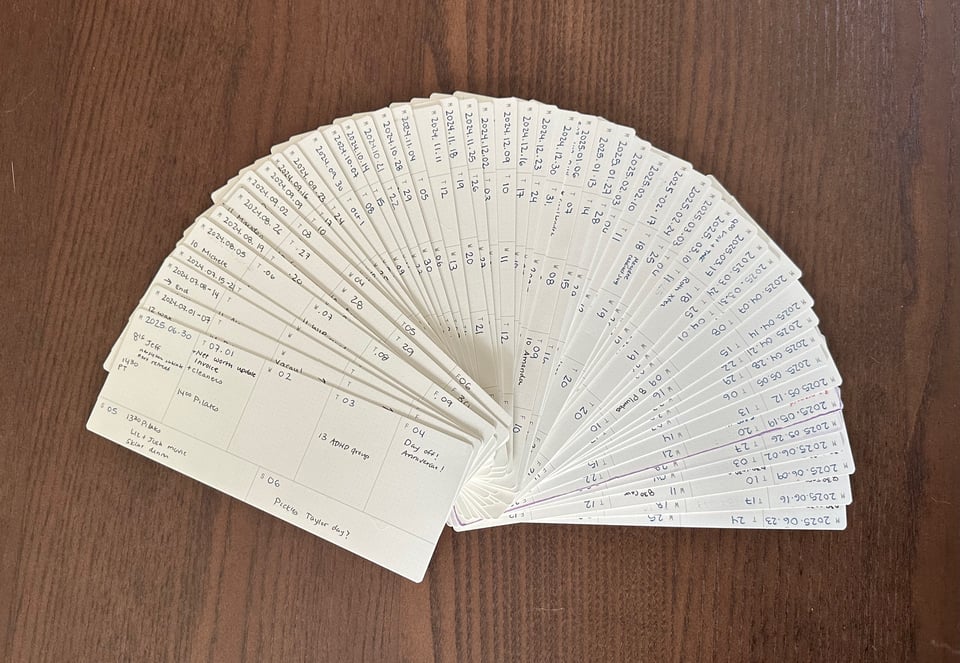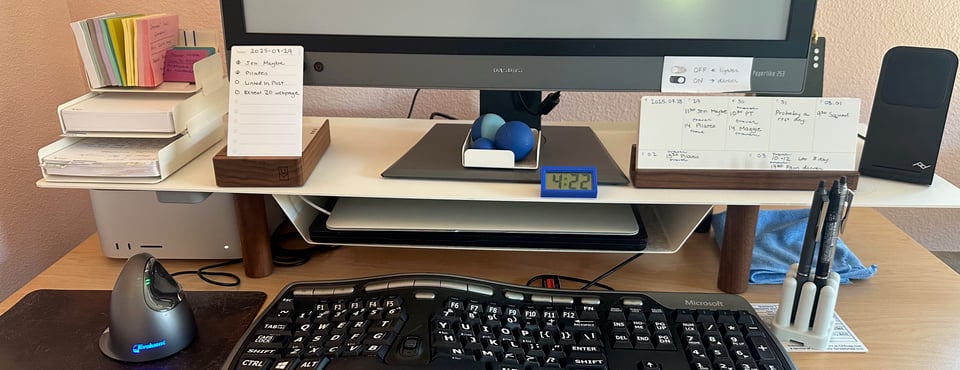Musing: How to be punctual with a wondering, wandering mind
Tl;dr: I talk about my writing retreat and share the first essay I've cut from my book project so you can get a sense of what the book will be like.
This edition of Smorgasbord Musings comes to you courtesy of the virtual writing retreat I hosted in late June1. After my applications for residential summer writing workshops were declined, a friend helped me brainstorm how else to get those needs met. (Thanks Jeff!) I looked around for other retreat options, but in a surprise to no one, I opted to DIY. I rounded up a couple of accomplices from past writing classes, hired a couple of guest speakers, and it was splendid.
Thank goodness I got rejected from those residential workshops. After four days of intensive book progress at my ideal pacing, which is less than half the activity of a residential workshop, I was pooped. I don’t have the stamina right now to do that kind of workshop, and I’m so relieved I got to figure that out gently at home instead of, say, in a dorm room in Vermont.
I spent most of the retreat working on reverse outlining what I have written since I started treating my book like a real thing last November. Reverse outlining meant reading through the chunks and condensing them into a topic sentence or two; organizing some more fragmented bits by theme; and adding notes about related life tips and tricks that were missing from my drafts. I originally tried doing this in Scrivener, but found that clicking around a digital card view didn’t help me get a sense of the volume of what I’ve already done. I needed something tangible. Writing by hand also activates different parts of the brain, and for me is especially helpful for supporting memory.

By the end of the retreat, I had a very satisfying pile of outline cards. (These are Ugmonk’s new Capture cards, which are about twice the size of a standard index card and a pleasure to use2.) I’d also found one nearly-done essay that is close to the style of the book, but content-wise not quite a fit for it. I figured this was the perfect chance to give Musings readers a sense of what I’ve been working on. Enjoy!
How to be punctual with a wondering, wandering mind.
Punctuality, on its surface, is simple. It’s “the fact or quality of being on time”3. Before we go any further, I want to take a moment to invite you to assess your life as it is now, and how punctual you really, truly need to be. Are there external structures where tardiness is penalized by the minute? These might be a child’s daycare, work that requires a clock-in, school (for you or someone you care for), etc. Are these penalties institutionalized, or is there a human you can negotiate some grace with?
If punctuality is not easy in your current season of life, communicating about the challenges you’re dealing with proactively is the very best lifehack I can offer you. Sometimes being vulnerable up front is easier than being on time. For example, my primary care physician’s office on paper requires you to be physically present 10 minutes before your appointment time. In practice, they’re fine with people who do their check-in paperwork online ahead of their appointment showing up as little as 3 minutes before their appointment time. Similarly, a bus schedule for a class had me arriving either 27 minutes early or 3 minutes late. I asked if it was okay for me to be regularly late even with mandatory attendance, and given that my name was near the end of the 40-student list, the teacher was fine with that.
If you were once a person for whom punctuality was easier, please pick a new punctuality standard for yourself. Let go of shoulding yourself so much about this. Past You is gone.
I was once able to achieve zero unexplained lateness. Now I’m shooting for whiffing on punctuality between 4-5% of the time, which works out to being late to between one in 20 and one in 25 things. Choosing an acceptable error rate has made the inside of my brain much calmer. To me, optimizing more than that isn’t worth the extra time and vigilance it takes. Most of my whiffs are five minutes or less of lateness, and even without proactive communication, I’ve built a life where five minutes late is rarely a problem.
Onto the nitty-gritty. Punctuality is a complex process. First, you need to make a viable plan that requires you to be in only one place at a time. Secondly, you need to remember that the plan exists. Thirdly, you need to know where you are in time so you know when to execute the plan. Finally, you need a route to graceful failure.
I like to joke that I’ve been on the sampler tour of ways brains can go awry. Brain fog? Memory formation impairment? Cognitive slowing? Hormone-induced noun loss? Involuntary hyperfocus? Chronic pain? Check, check, check. Through all of these tour stops, my punctuality supportive systems have evolved: here they are, organized by process step.
A viable plan
To start with, there must be a single source of truth to consult about your time-based commitments. I am capable of losing a piece of paper in the moment between receiving it and reaching toward a pocket, so my single source is a digital calendar app that aggregates my personal and business calendars into one. My digital calendars rule my life.
I learned during my long stint in public accounting that my brain is unusually slow at intentional task switching, and that my feathers get unbearably ruffled when conversations are brought to an abrupt end by the end of a calendar item. I need soft transitions. To support this, now that I’m self-employed, my client booking software enforces at least 15 minutes between appointments, which means I have room to bring conversations to a natural close and space to change between brain modes. I can pull off one back-to-back meeting in a day, but more than that is not a viable plan for me.
If I have to be somewhere besides my desk, I include travel time in the appointment block. Doctor appt at 10 across town? On my calendar, the appointment will read “Dr. X at 10,” but the appointment block will last from 8:30 to 11:45. If I book myself a particularly intense day (four or more commitments), I block out as much of the next morning as I can to recover. Time blocking rest is part of making all the other plans viable.
If I have to leave the house for the thing, I check the bus timing the day before, and assume I need 20 minutes more than the trip planner thinks I do to get to the bus stop. I have yet to find a way to reliably exit the house efficiently with the right things in my pockets; at this point, I think optimizing my exit is a lost cause, so I just add time padding. If I goof while taking the bus (miss a stop and thus a transfer, etc), I have a ride share budget I can use to make up the time. If I’m taking a ride share, I try to summon one at the point where the app thinks it would get me there twenty minutes early, which usually ends up getting me there 2-10 minutes early.
Remembering the plan exists
A few days before the week starts, I use erasable pens to fill out a weekly sheet with my fixed commitments. (I am long on Pilot Frixion pens and refills.) This gives me a chance to think about the overall pacing of the week and figure out where I have room to do longer chunks of focused time or take a nap if I need one. This sheet stays propped up on my desk all week. A year ago, I switched from my DIY printable spreadsheet version to Ugmonk’s weekly system. Congratulate me, for the first time, I’ve used a single system for an entire year!

At the start of each day (or sometimes the night before), I write down the list of meetings for the day and the two things I most want/need to get done on an Analog Daily card. This card stays visible all day; sometimes it comes with me if I’m trying to errand chain. This third repetition of taking in the existence of the meeting (as a digital thing, as a tangible thing on the weekly sheet, and as a tangible today thing) solidly plants it in my brain as a thing to pay attention to. I’m a data-collecting nerd, so I can tell you that adding in that third repetition TRIPLES my odds of remembering the plan exists compared to two reps. If my brain is especially foggy, I quadruple up when writing down my day and ask my phone to set alarms for the start of each part of the plan.
Knowing where I am in time
I’ve scattered a lot of large-type digital clocks designed for car dashboards all over the house, including one right in front of my monitor on my desk. (There are solid reasons to prefer analog clocks since they represent time as physical, inflexible wedges of space, but I can’t read them reliably with my vision.) Not all human brains include a built-in quantitative sense of time passing (a sort of internal clock), and while my brain has one, hyperfocus turns it off. Even if I successfully extract myself from a “Squirrel!” moment, my sense of time passing stays suspended. Seeing a clock helps me turn it back on. (If you want a whole system perfected for brains without a built-in sense of time passing, here you go.)
If I get up from my desk to do something, I ask my phone voice assistant to set a timer for ten minutes before my next meeting. Pro tip: Siri will set a timer to go off at a specific time; you don’t need to do time math to figure out how long the timer should be set for. If I’m going to do the kind of task I get lost in (writing, research), I have the timer set for five minutes before the meeting. After that timer, the only allowable activity is listening to one song and stretching! I have, more than once, started ‘one quick email’ after the pre-meeting timer only to miss the next meeting entirely while writing4.

Graceful failure
For many years, I had to reschedule 30% of plans and meetings due to migraines popping up. Before I went to bed, I’d draft an email to all the people I had meetings with the next day, so all I had to do if I woke up with a migraine was press send. Canceling so frequently used to stress me out, until another introvert invited me to think about how I felt about someone else canceling plans. I was usually pretty excited about the found time!
This first and sixth drafts of this essay, in fact, were brought to you by my friend “Jen Maybe”, who regularly gifts me found time. Jen has the beautiful habit of including another time that could work in her cancellation texts and emails. This keeps us from falling off each other’s calendars entirely.
Maintaining continuity through cancellations is key to keeping relationships going. Other options for this:
a recurring meeting set to occur more often than you actually want to meet: then cancellations set you up for the desired frequency;
a recurring reminder to make plans to hang out together that lives on both your calendars;
ending each time you hang by making sure you have two future meetings on the books instead of just one, so that if one falls through, you’re still good to go.
At this point, I shoot to be writing in the time chunk before a hang with Jen Maybe. Either I’ll get to talk with Jen - who, to be clear, is awesome! - or I’ll find myself already in a good spot to make use of an extra hour of writing time.
Sometimes I wonder if I’m “Kat Maybe” to Jen. I’m the easiest person to cancel on. Being the first thing to get cut on someone’s calendar can feel crummy. But I also know how it feels to be on the other side of a gracious reschedule - sometimes it’s the highlight of a hard day. I’d rather be the highlight by way of a great conversation, but if I can be the highlight by being warm while moving a meeting, I’ll take it.
Being punctual sometimes means getting someplace awkwardly early instead of a minuscule amount of late. I usually say something like “Oh yes, that’s me, chronically early! Ha! Ha!” I wish I had the guts to say “Look less things went wrong on the way here than I expected, and I don’t like to be wrong even in a good way, and there wasn’t a dry safe place to lurk while I felt my feelings about that, so can you please ignore me until I’m only two minutes early, thanks.”
At this point, I’m convinced that most punctual people are not inherently good at navigating time. We’re just anxious wrecks with a lot of supportive systems. This is good news: it means punctuality is a set of skills you can choose to put effort into improving, even if your brain doesn’t do punctuality naturally.
You can also choose to change your approach to punctuality: you are in charge of what value you ascribe to being on time.
It was so good I’ve got a second one scheduled September 29 - October 2. If you’re a writer with a project that could use some focused time with colleagues and would like an invite, reply and let me know! ↩
Hiya, this is a good moment to note that I do not use affiliate links or do sponsored content. I am way too easily influenced by money, and way too attached to my independence to mix myself up that way. This email has multiple pictures of and references to Ugmonk products because I use a lot of Ugmonk products. Frankly, being in charge of deciding how much it’s reasonable to spend on office supplies is one of my favorite things about being self-employed. ↩
New Oxford American Dictionary ↩
Surprisingly, both of the prospective clients this has happened with ended up hiring me anyway. Not the outcome I would have predicted. ↩